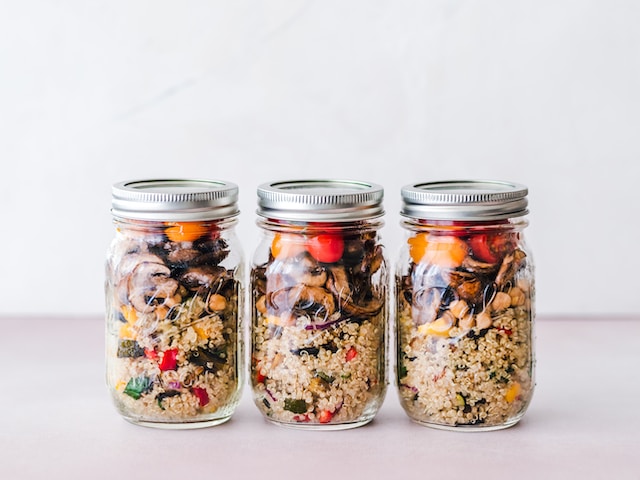Meal prepping for the week is a great way to ensure you are eating healthy and staying on track with your nutrition goals. It can be daunting to get started, but with the right planning it can be an effective time-saver that sets you up for success.
As a nutritionist, I’m here to provide you with some tips and strategies for preparing meals in advance so that you can stay healthy and save time throughout the week.
Meal prep doesn’t have to be complicated or time-consuming; if done correctly, it can actually save you a lot of energy and effort during the week. With these simple steps, I’ll show you how easy it is to create nutritious meals ahead of time without sacrificing flavor or quality.
So let’s get started!
Pre-Planning Your Meals
Meal prepping for the week is a great way to stay healthy and save time. It’s important to know how to plan ahead so you can make sure you’re eating nutritious meals throughout your busy week. Here are some tips on how to get started.
First, take some time at the start of each week to plan out what meals and snacks you’ll be preparing. You don’t have to be overly specific, but getting an idea of what you’ll eat during the week will help keep you organized.
Make a list of ingredients that you’ll need for each meal or snack and add them to your grocery list. This will ensure that you have all the necessary items on hand when it’s time to prepare your food.
Once you’ve got your grocery list together, head out shopping! Try choosing foods with plenty of nutrients like fruits, vegetables, whole grains, lean proteins and healthy fats. These foods will provide energy and fuel for your body without overloading it with unhealthy ingredients.
Plus, having all these foods ready for meal prep makes it much easier when it comes time to cook!
Shopping For The Right Ingredients
Creating a healthy meal plan for the week requires careful shopping. To get started, you should make a list of meals that you would like to prepare and any specific ingredients needed. Then, it’s time to hit the store!
Here are some tips for choosing the right ingredients:
- Macronutrients:
- Proteins: Choose lean sources such as fish, poultry, legumes, and tofu.
- Healthy fats: Opt for heart healthy meals and oils (e.g., olive oil and canola oil) as well as nuts, seeds, and avocados.
- Micro-nutrients:
- Whole grains: Look for items such as brown rice, quinoa, oats, millet, and buckwheat.
- Fruits & vegetables: Make sure to include plenty of fresh produce in your weekly meal plan.
When shopping for groceries be sure to read labels carefully so that you’re aware of added sugars and sodium content in your food items. Eating nutritious foods helps maintain a healthy weight while providing essential vitamins and minerals necessary for optimal health.
By following these guidelines you can create balanced meals that will help keep you energized throughout the week.

Making Your Meals Ahead Of Time
Making your meals ahead of time can be a great way to ensure you’re eating healthy throughout the week. It’s like packing a lunch for yourself before the day begins – but on a bigger scale.
With some careful planning and prepping, you can make sure you have nutritious meals ready to go during your busiest times.
The first step is to plan out what meals you want to eat over the course of the week. You can use an app or website to create a meal plan or write it down in a notebook. Then, determine what ingredients you need and do one big grocery shop at the start of the week so you have everything on hand that you need.
Once you have all your ingredients ready to go, it’s time to get cooking! Break up your meal prep into manageable chunks so that it doesn’t become overwhelming – for example, dedicate one day to chopping up vegetables and another day for cooking protein sources for the week ahead.
Be sure to use proper food storage techniques like placing cooked foods in air-tight containers and dividing them into individual servings so that they don’t spoil before you can enjoy them.
With some preparation and organization, making meals ahead of time will help set you up for success with staying healthy all week long!
Storing Your Prepped Meals
Storing your prepped meals is essential for keeping your food safe, nutritious, and delicious. When it comes to storage containers, glass or BPA-free plastic are the best choices. It’s important to avoid storing food in single-use plastic containers or bags as these often contain harmful chemicals that can leach into the food over time.
Be sure to label and date each container with the name of the meal and when it was prepped. This will help you keep track of how long the food has been stored and when it should be eaten by. If you’re using Tupperware-style containers, make sure they are airtight so no moisture or odors can get in. Also check that they are microwave safe if you plan on reheating any meals later in the week.
If you’re storing liquids like soups or stews, use wide-mouth jars so they can easily be poured out without making a mess. Plastic bags should only be used for frozen items that won’t require reheating such as meats or veggies that are ready to go straight into stir fries or salads. It’s also important to consider where you store your meals in order to keep them fresh for as long as possible.
Refrigerate all perishable foods immediately after prepping them and place them at the back of the fridge where it’s coldest and least likely to spoil quickly due to fluctuating temperatures from opening and closing doors frequently. Freezing cooked meals is another great way to extend their shelf life – just be sure to wrap them well before freezing so they don’t dry out or become freezer burnt!

Keeping Variety In Your Diet
Eating the same meals all week can be a great way to save time and energy, however it shouldn’t come at the cost of nutrition. You can still maintain healthy eating habits while also keeping variety in your diet.
To avoid getting bored with the same meals, try spicing things up by using different ingredients and cooking methods. For example, you could turn grilled chicken into tacos one day, a burrito bowl the next day, or use it as a topping for a salad. Similarly, you can use different proteins such as fish and tofu that are rich in essential vitamins and minerals.
It’s also important to make sure you’re including plenty of fruits and vegetables in your meal prepping. Pre-chopping vegetables such as peppers, onions and carrots can help make them convenient for adding to meals throughout the week.
Additionally, having frozen fruits on hand is an easy way to add variety to smoothies or yogurt bowls!
Staying On Track With Your Nutrition Goals
When it comes to meal prepping for the week, there’s no denying that staying on track with your nutrition goals can be difficult. But the truth is, with a little effort and commitment, it’s not impossible!
Nutritionists and dietitians alike agree that having a healthy meal plan in place ahead of time can make all the difference when trying to reach those goals. So how exactly do you go about setting up a successful meal plan?
The first step is to make sure you have an adequate understanding of your nutrient needs. Are you looking to gain muscle mass? Trying to lose weight? Or maybe just maintain your current physique? No matter what your nutritional goals are, it’s important to calculate your daily caloric intake based off of these desired outcomes. That way, you can begin to craft meals that are tailored specifically for you.
Next, focus on making balanced meals. This means including all five food groups: proteins, carbohydrates, dairy products, fruits & vegetables and fats & oils. Aim for variety as well; try adding a different protein source or vegetable every day! This will ensure that you’re getting an array of vitamins and minerals from each plateful.
To top things off, don’t forget about portion control – measuring out accurate servings sizes will help keep calorie counts in check too.
By taking into account these three key components – understanding one’s nutrient needs, eating balanced meals with variety and portion control – anyone can set themselves up for success with their weekly meal prep routine. With some determination and dedication, reaching those nutrition goals will be easy peasy!
Conclusion
To wrap up, meal prepping is a great way to make sure that you stay on track with your nutrition goals and maintain a healthy lifestyle. It will save you time, money, and the hassle of figuring out what to eat every day.
Plus, it’s been shown that people who meal prep have an easier time sticking to their diet and lose more weight than those who don’t.
I encourage you to give meal prepping a try! With some practice and planning ahead of time, it can become an easy habit that pays off in the long run.
By ensuring that you have healthy meals ready to go each week, you’ll be better equipped to reach your nutrition goals – plus, you won’t have to sacrifice taste for health either!



































